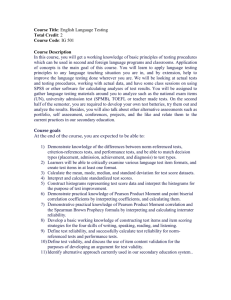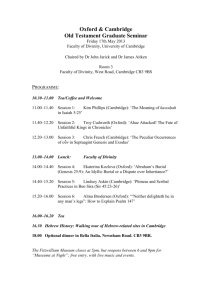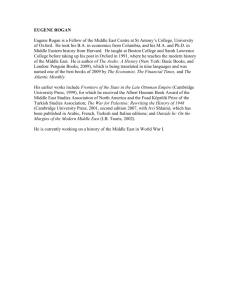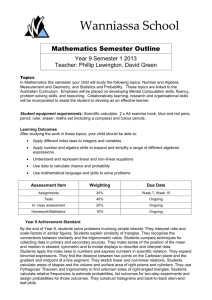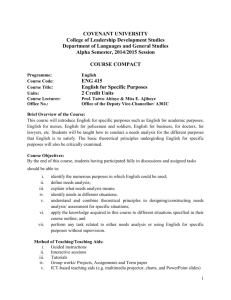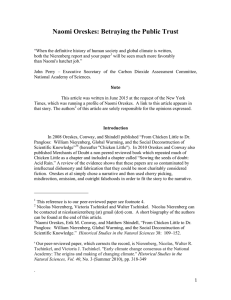Spring 2015 Syllabus (Washington State University)
advertisement
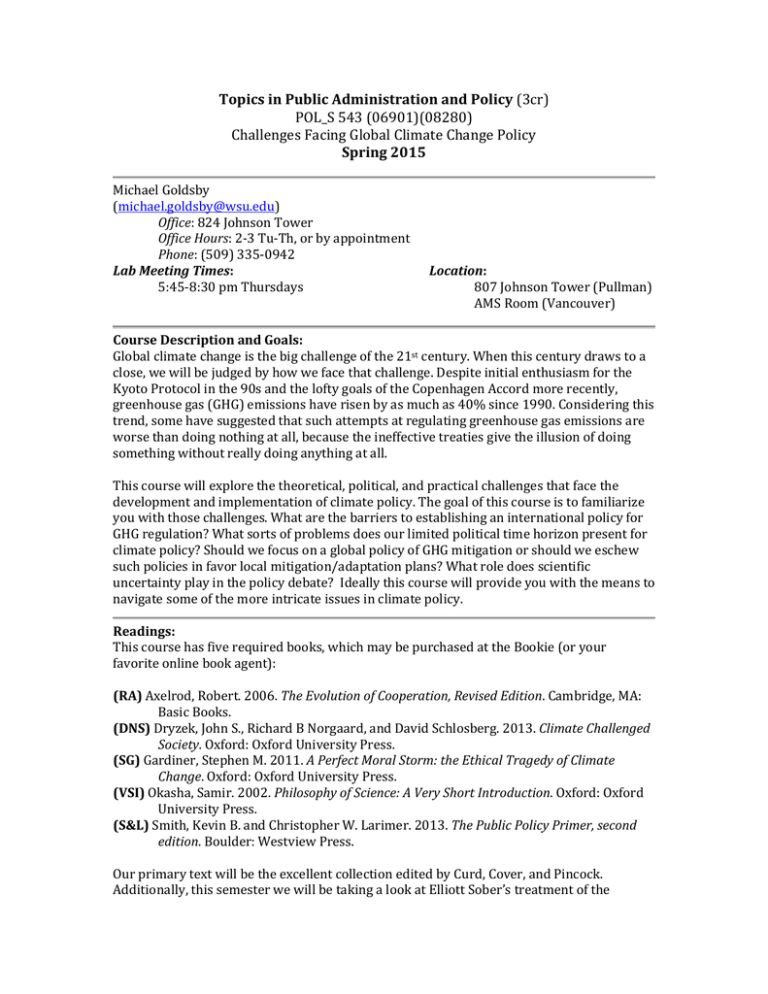
Topics in Public Administration and Policy (3cr) POL_S 543 (06901)(08280) Challenges Facing Global Climate Change Policy Spring 2015 Michael Goldsby (michael.goldsby@wsu.edu) Office: 824 Johnson Tower Office Hours: 2-3 Tu-Th, or by appointment Phone: (509) 335-0942 Lab Meeting Times: 5:45-8:30 pm Thursdays Location: 807 Johnson Tower (Pullman) AMS Room (Vancouver) Course Description and Goals: Global climate change is the big challenge of the 21st century. When this century draws to a close, we will be judged by how we face that challenge. Despite initial enthusiasm for the Kyoto Protocol in the 90s and the lofty goals of the Copenhagen Accord more recently, greenhouse gas (GHG) emissions have risen by as much as 40% since 1990. Considering this trend, some have suggested that such attempts at regulating greenhouse gas emissions are worse than doing nothing at all, because the ineffective treaties give the illusion of doing something without really doing anything at all. This course will explore the theoretical, political, and practical challenges that face the development and implementation of climate policy. The goal of this course is to familiarize you with those challenges. What are the barriers to establishing an international policy for GHG regulation? What sorts of problems does our limited political time horizon present for climate policy? Should we focus on a global policy of GHG mitigation or should we eschew such policies in favor local mitigation/adaptation plans? What role does scientific uncertainty play in the policy debate? Ideally this course will provide you with the means to navigate some of the more intricate issues in climate policy. Readings: This course has five required books, which may be purchased at the Bookie (or your favorite online book agent): (RA) Axelrod, Robert. 2006. The Evolution of Cooperation, Revised Edition. Cambridge, MA: Basic Books. (DNS) Dryzek, John S., Richard B Norgaard, and David Schlosberg. 2013. Climate Challenged Society. Oxford: Oxford University Press. (SG) Gardiner, Stephen M. 2011. A Perfect Moral Storm: the Ethical Tragedy of Climate Change. Oxford: Oxford University Press. (VSI) Okasha, Samir. 2002. Philosophy of Science: A Very Short Introduction. Oxford: Oxford University Press. (S&L) Smith, Kevin B. and Christopher W. Larimer. 2013. The Public Policy Primer, second edition. Boulder: Westview Press. Our primary text will be the excellent collection edited by Curd, Cover, and Pincock. Additionally, this semester we will be taking a look at Elliott Sober’s treatment of the intelligent design movement. We will supplement the text books with the following readings, which I will make available to you on Blackboard: Baxter, William. 1974. The Case for Optimal Pollution. From People or Penguins: The Case for Optimal Pollution. New York: Columbia University Press, 1-13. Committee on the Fiscal Future of the United States (CFFUS). 2010. Choosing the Nation’s Fiscal Future. Washington D.C.: The National Academies Press. Frigg, Roman, Seamus Bradley, Hailiang Du, and Leonard A. Smith. 2014. Laplace’s Demon and the Adventures of His Apprentices. Philosophy of Science, 81: 31-59. IPCC. 2013. Summary for Policymakers. In T. Stocker, D Qin, G. Plattner, M. Tignor, S.K. Allen, J. Boschung, A. Nauels, Y. Xia, V. Bex, & B Midgley (Eds.), Climate Change 2013: The Physiscal Science Basis – Working Group I Contribution to the Fifth Assessment Report of the Intergovernmental Panel on Climate Change. Cambridge: Cambridge University Press. IPCC. 2014. Summary for Policymakers. In O. Edenhoffer, R. Pichs-Madruga, Y. Sokona, j. Minx, E. Farahani, S. Kadner, K. Seyboth, A. Adler, I. Baum, S. Brunner, P. Eickemeier, B. Kriemann, J. Savolainen, S. Schloemer, C. von Stechow, & T. Zwickel (Eds.), Climate Change 2014: Mitigation of Climate Change – Working Group III Contribution to the Fifth Assessment Report of the Intergovernmental Panel on climate Change. Cambridge: Cambridge University Press. Nordhaus, William. 2007. A Review of the Stern Review on the Economics of Climate Change. Journal of Economic Literature, 45: 686-702. Oreskes, Naomi, David Stainforth, and Leonard A. Smith. 2010. Adaptation to Global Warming: Do Climate Models Tell Us What We Need to Know? Philosophy of Science, 77: 1012-1028. Oreskes, Naomi and Erik Conway. 2010. The Denial of Global Warming. From Merchants of Doubt: How a Handful of Scientists obscured the Truth on Issues from Tobacco smoke to Global Warming, 169-215. Ostrom, Elinor. 2010. Polycentric Systems for Coping with Collective Action and Global Environmental Change. Global Environmental Change, 20: 550-557. Pindyck, Robert. 2011. Fat Tails, Thin Tails, and Climate Change Policy. Review of Environmental Economics and Policy, 5(2): 258-274. Sagoff, Mark. 2000. At the Monument to General Meade, or On the Difference Between Beliefs and Benefits. Arizona Law Review, 42(2): 433-462. Stern, Nicholas. 2006. Executive summary: The Economics of climate change: The Stern Review. Cambridge: Cambridge University Press. Sunstein, Cass. 2007. Of Montreal and Kyoto: A Tale of Two Protocols. Harvard Environmental Law Review, 1:9. Weitzman, Martin. 2009. On Modeling and Interpreting the Economics of Catastrophic Climate Change. Review of Economics and Statistics, 91(1): 1-19. Course Requirements: Your grade in this class will be determined by two factors: (a) the merits of your work on the writing assignments; and (b) your participation in the class. These factors are weighted as indicated below: Writing Assignment 1 Writing Assignment 2 Participation 30% 60% 10% 1. Writing Assignments – You will write two papers for this class. The first of which will be a short essay (5 pages double spaced) on an issue related to climate change. For the second longer essay (15 pages) you have two options: (i) you may expand upon the analysis provided in your first essay first essay; or (ii) you may write a new piece altogether. Whichever option you choose, however, you are required to discuss your topic with me. The formatting of your papers should use 12 pt font and have 1” margins, and should consist of your own work. Plagiarism is taking someone else’s work and claiming that it is your own. When you submit a writing assignment, it is assumed that you are claiming that the work is your own. Thus, if you submit the work of another, you are plagiarizing. Plagiarism is a serious academic offense, and it will not be tolerated. More details about the writing assignments will be given when the papers are assigned. See the tentative schedule for due dates. 2. Participation – All of you are junior professionals in your chosen fields. As such, it is expected that you participate in all class discussions so that you get the most out of it. Additionally, I will be running this class as a think tank. As such, your participation will contribute to the success of our project. I will be keeping track of how well you participate in class. You will receive a numerical score (0-100) based on weighted average that corresponds to the breakdown indicated above. I will use that score to assign you a letter grade according to the following scale: A 93-100 A90-92 B+ 88-89 B 83-87 B80-82 C+ 78-79 C 72-77 C70-72 D+ 68-69 D 60-67 F < 60 You will note that there are some swing grades (e.g. between A and A- (92-93)). If you receive a final score that is such a swing grade, then your letter grade will be determined by two factors: (1) how close you are to one score or the other (e.g. 92.75 is closer to 93 than 92.25); and (2) how well you’ve participated in class. Guidelines and Policies: Attendance – Attendance is mandatory. Failure to attend lecture will impact your grade both directly and indirectly. First of all, it is very difficult to participate if you do not attend lectures, and thus absences will have an effect on your participation grade. Additionally, much of the material in this class might be new to you – not to mention difficult – meaning that your likelihood of success will decrease with every absence. Lecture – Our time together is very precious, and as such, I expect you to attend the lectures having read the assigned readings and generally ready to learn. This also means that during class time there should be nothing on your desk that is not required for class (e.g. no newspapers, books from other classes, etc.). All cell phones should be silenced. Laptops and tablets may be used for note-taking if you wish. Also you may use any compatible device to access the Top Hat system, but you should not be checking email, tweeting, texting to friends, facebooking or doing anything else distracting while in lecture. Transgressions may result in a penalty to your participation grade. Communications Policy – The best way to get in touch with me is via email. I have my phone number listed above, and you are welcome to give me a call. However, you are much more likely to get a response or acknowledgment via email. I check my email frequently, and I will generally make every effort to respond to your emails in a timely manner (usually within a couple of hours). However, there might be rare cases during the semester when it takes up to 48 hours for me to do so. Thus, you should plan accordingly, if there is a time constraint that you are worried about. Respect in the Classroom – Over the course of the semester, we may discuss some very sensitive issues – ones that may cause your blood to boil. I think J.S. Mill said it best when he said, “there is nothing that offends no one, and no one who is offended by nothing.” It is possible that you may leave lecture very upset about the day’s discussion – good! I hope that I challenge you to think about issues of such import that they would make us angry, sad and wanting to make a change in our lives or the world. However, I expect everyone to treat every other member of this class with the highest degree of respect. Acting otherwise will result in dire consequences for the transgressors. Academic Integrity – I expect all of you to hold yourselves to the highest standards of academic integrity in this class. The Standards of Student Conduct defines plagiarism as “Presenting the information, ideas, or phrasing of another person as the student's own work without proper acknowledgment of the source. This includes submitting a commercially prepared paper or research project or submitting for academic credit any work done by someone else. The term "plagiarism" includes, but is not limited to, the use, by paraphrase or direct quotation, of the published or unpublished work of another person without full and clear acknowledgment. It also includes the unacknowledged use of materials prepared by another person or agency engaged in the selling of term papers or other academic materials” WAC 504-26-010 (3-i). Plagiarism or any other breach of academic integrity will not be tolerated. Any such violation will result in a failing grade for the course. Additionally, I will provide a written report of each instance of academic dishonesty to the Office of Student Standards and Accountability. Special Arrangements – Reasonable accommodations are available for students with a documented disability. If you have a disability and may need accommodations to fully participate in this class, please visit the Access Center. All accommodations MUST be approved through the Access Center. Please stop by or call 509-335-3417 to make an appointment with a disability specialist. Also if you do have approved accommodations please let me know by the second week of class. Safety Statement - “Washington State University is committed to enhancing the safety of the students, faculty, staff, and visitors. It is highly recommended that you review the Campus Safety Plan (http://safetyplan.wsu.edu/) and visit the Office of Emergency Management web site (http://oem.wsu.edu/) for a comprehensive listing of university policies, procedures, statistics, and information related to campus safety, emergency management, and the health and welfare of the campus community” (Office of the Vice Provost for Undergraduate Education 2013). Problem Solving – I’m certain that during the course of this semester you will have questions and problems– both ones that have to do with the class material and ones that have to do with the everyday mechanics of the class. You should feel free to get a hold of me (or your TA) to help you answer these questions, and if we put our heads together most problems can be resolved. I am available for you during office hours, by appointment, and by email (which I check often). Take advantage of this fact! You should treat your instructors (including me) as a resource to aid you in your learning; this is, after all, your education. Additionally, if you do need such help, the earlier you let me know the better. I have more options available to help you earlier in the semester than later. *I reserve the right to change the contents of this syllabus at any time during the semester. Learning Objectives Learning Objective Successful Graduate Student Learning Outcomes Progress will be assessed by: To prepare students to achieve their professional goals and prepare them to pursue professional careers by familiarizing them with the philosophical foundations of their chosen disciplines. The student will have a familiarity with the philosophical underpinnings of the concepts, theories, and emerging methodologies in climate policy. Performance on written assignments. To prepare students to be effective researchers in their respective disciplines. The student can communicate research effectively in both written and oral forms. Performance on the final written assignment, and in class discussion. The student will be able to justify and defend her or his respective research methods. To prepare students to be effective communicators to the general public regarding scientific/policy issues related to climate change. Students can explain the value Performance in in class of their research to those outside discussion and the final writing of their discipline. assignment Students can explicate and defend the logic behind their research methods to nonspecialists. Tentative Schedule The following schedule is subject to change. Week Topic Text Book Readings 1 Introduction S&L Chapter 1 DNS Chapter 1 SG Preface, Intro and Chapter 1 S&L Chapters 2,3,4,7,8 and 10 VSI Entirety 15 Jan 2 Policy Basics 22 Jan 3 Philosophy of Science Additional Readings/ Assignments 29 Jan 4 Climate Science IPCC (2013) 5 Feb Mitigation SG Chapter 11 SG Chapter 2 RA Entirety DNS Chapters 5,6 SG Chapters 3,4 Sunstein (2007) 26 Feb Modeling Challenges: A Game Theoretic Approach International Policy Challenges 8 Economic Challenges DNS Chapter 3 Stern (2006) Nordhaus (2007) Weitzman (2009) Pindyck (2011) Failures of Cost-Benefit Analysis SG Chapter 8 S&L Chapter 5 Baxter (1974) Sagoff (2000) Spring Break (Consider getting ahead on the reading) Written Assignment 1 Due Thursday 12 Mar 2014! Try to recharge, and stay safe! Challenges Facing Adaptation DNS Chapters 7,8 Challenges for Geoengineering Intergenerational SG Chapter 11 5 IPCC (2014) 12 Feb 6 19 Feb 7 5 Mar 9 12 Mar 10 16-20 Mar 11 26 Mar 12 2 Apr 13 SG Chapters 5,6 Oreskes, Stainforth & Smith (2010) Frigg et al. (2014) CFFUS (2010) 9 Apr 14 Challenges Theoretical Challenges SG Chapter 7 Ostrom (2010) Denialism SG Appendix 2 Oreskes & Conway (2010) TBD 16 Apr 15 23 Apr 16 30 Apr Wrap up

